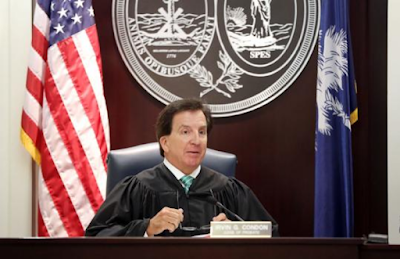By David Slade
Nearly two months after being told to reimburse Charleston County $11,342 in unauthorized expenses, Probate Judge Irv Condon has instead hired a lawyer.
The move comes after a county audit flagged more than 18 percent of the county charge-card purchases made by his office as questionable from late 2021 through early 2024.
Most of the questioned spending was for office-related expenses that had not been approved, such as food, gift cards and employee appreciation.
County officials said the unauthorized spending had been a repeated and years-long problem with the elected Republican judge, and took the unusual step of ordering him to personally repay most of the charges.
At
a May 7 County Council meeting where the issues came to a head, Condon
conceded that his office hadn't followed procedures involving county
charge cards, and said he regretted that. The council ordered him to
personally repay $11,342, but did not set a deadline.
"We sent him an invoice, to remind him what it was and remind him that he owed it," Council Chairman Herb Sass said. "We haven’t heard from him."
Nearly two months later during the first week of July, Charleston lawyer Ronald Richter responded on Condon's behalf to several days of text messages from The Post and Courier seeking comment.
"A full response to the county’s concerns is forthcoming," said Richter, who has been retained by Condon.
Members of County Council want to see the debt settled.
"Our only concern at this point is that he pays the money he owes," Councilwoman Jenny Honeycutt said July 3.
Honeycutt, a lawyer who in May proposed the motion to have Condon repay the more than $11,000 back, said she thought "we were past wrangling over the facts of what happened."
"The rules are the rules, and they apply to everybody," she added. "If you need pre-approval for a luncheon, get pre-approval and don’t make everyone uncomfortable."
Richter said there doesn't seem to be a precedent for the county to demand repayment "for expenditures that are clearly in the scope of his services."
He also alleged that "retaliatory budget cuts" were made by the county, amounting to $240,000 Condon had requested in the court's budget.
"I know that services were cut that we believe are essential services of the Probate Court," he said.
According to Charleston County, the Probate Court's total budget actually increased by $240,000. The county did reject a number of line items Condon had requested, including $70,000 for a "community outreach vehicle" and increased funding for meetings, training events and employee recognition.
"You can’t have everything you ask for," said Honeycutt.
Some of the budget items the county eliminated were for the same sorts of expenses Condon had been paying for with county charge cards without approval, according to the audit and county officials.
For example, the Probate Court’s Estates Division had a $2,500 budget line for meeting expenses this year, but hadn't spent any of that money when budget talks began. Condon requested $15,000 for the coming year, but the county’s budget includes zero dollars.
In the same division, Condon requested $1,800 for employee recognition — $1,300 more than the current year — but the county’s pending budget includes no money.
“Because of his recent history, he maybe didn’t get some of the things he wanted,” said Sass. “We’re not being heavy-handed.”
In the Probate Court’s Commitment Division, Condon asked for more than four times the amount budgeted for the current year for meeting expenses; instead the county budgeted nothing. The county budget also zeros out meeting expense money for Adult Drug Court, and training and conference funding for both Mental Health Court and Probate Veterans Court.
Overall, funding for the Probate Court increased from $3.7 million to $3.94 million in the county budget.
The dispute has not involved partisan rivalry because the majority of County Council members, including Sass and Honeycutt, are Republican elected officials, as is Condon.
"I don’t want to embarrass him, but he needs to go ahead and pay the damn bill," Sass said.
Full Article & Source:
Declining to pay, Charleston Probate Judge Irv Condon balks at debt, instead hires attorney



















